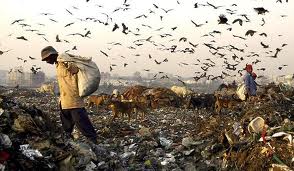 Just after the Lunar Eclipse in June, the sky was shimmering with transits.Neptune was stationary and the Solstice was right around the corner, with the first exactitude of the Uranus-Pluto square on its heels. As if hearing the signal, two significant reports were released about global warming.1 For the astrologically inclined, the language used in one of the papers was especially striking. The scientists said Earth was approaching a “tipping point”.
Just after the Lunar Eclipse in June, the sky was shimmering with transits.Neptune was stationary and the Solstice was right around the corner, with the first exactitude of the Uranus-Pluto square on its heels. As if hearing the signal, two significant reports were released about global warming.1 For the astrologically inclined, the language used in one of the papers was especially striking. The scientists said Earth was approaching a “tipping point”.
This phrase is sometimes used by astrologers to refer to the period between 2008 and 2023, a critical threshold in time over which humanity is now hovering.2 The scientists’ paper went into detail about unchecked population growth, fossil fuels and the conversion of almost half of the planet’s land to farms or cities. The news held no surprises for people who care about these things.
This got me wondering: what does it mean to not care about these things?
Limited Scope
I think it must be true that most of the people living on the Earth focus their attention pretty much exclusively on their own personal lives, within the scope of their domestic unit, tribe, village or locality. For the massive numbers of souls who live hand to mouth— almost half the global population3 – the reasons for this limited focus are self-evident.
For the other half, however, whose day-to-day survival is not in question and whose access to information is just about infinite, the question does seem to cry out for explanation. Why is our scope so limited? Why is there so much ignoring going on?
Many of us in the privileged sector might explain our lack of interest by saying we are just too overwhelmed. This overwhelm seems to be partly intellectual: there is too damn much information, nonstop and ubiquitous. Harder still to deal with is the emotional overwhelm. We erect boundaries against the things we allow ourselves to care about. Maybe we see ourselves as having only a certain amount of compassion to go around, and if we let in everything there is to care about, our reservoir would get used up.
 I believe we suffer from a kind of moral paucity, too, in the dis-ensouled4 industrialized world. In place of the moral certainties that earlier epochs received from their shaman, guru or priestess, all secular Westerners have are the opinions of talking heads on TV. Granted, the potential for misuse, via brainwashing, may be comparable between these ancient and modern interpreters of meaning. But there is a hole where ethical guidance used to be.
I believe we suffer from a kind of moral paucity, too, in the dis-ensouled4 industrialized world. In place of the moral certainties that earlier epochs received from their shaman, guru or priestess, all secular Westerners have are the opinions of talking heads on TV. Granted, the potential for misuse, via brainwashing, may be comparable between these ancient and modern interpreters of meaning. But there is a hole where ethical guidance used to be.
Spiritual Cohesion
Yet we do have all the pieces. We don’t lack for the various ingredients that could provide a sense of psychological, moral, and spiritual cohesion. We have access to the knowledge that could help us cope with the world.
Among those moderns who have rejected established religion, many have access to a moral compass through other wisdom paths. They may have tried yoga and meditation, subscribe to the philosophy of holistic health or be familiar with New Age ideas such as karma and we–create–our-own-reality. They may have even taken classes on Marxism, Buddhist thought and ecology in college. They have heard the great truths reframed. Yet there seems to be a big difference between hearing these things and applying them to the here- and-now.
Whence this gap between theory and practice, and between ideal and feeling?
We may declare ourselves in agreement, for example, with the spiritual truism that Everything is Connected, yet feel utterly uninterested in the international scene; estranged even from what’s happening in countries that share a border with our own. We may consider the Butterfly Effect unarguably true — with respect to bee colonies and ice caps, but not with respect to human societies in turmoil.
I think we must account it a curious inconsistency that many people have no problem believing that the tiniest shift in animal behavior anywhere on Earth has impact on the whole global ecosystem except where the human animal is concerned. Once the conversation turns to the decline of drinking water in war-ravaged East Africa, suddenly the boundaries go up and the speaker declares himself “apolitical”5.
Psychic Pick-Up
But this information cannot be kept out. If one believes that all beings are connected, one must also believe that what happens in one corner of the world is felt in every other corner. We are all privy to it, on some level of consciousness. Whether we read the newspaper or soak up world events psychically, we are all swimming together in the soup of what’s happening in the human family. The key is what we do with the information.
When we shut down to it, we inadvertently shut down other of our psychic mechanisms, too. During the tipping point years, when shutting down will become increasingly hard to do, the effort to close ourselves off will require that we clamp down more and more parts of ourselves. This will make the choice to ignore more and more unhealthy.
The fact that it will get harder and harder to ignore the world is, of course, in the best interests of the rebirth of the planet, which can only heal if humanity has its eyes wide open. It is also in the interests of our own personal evolution. Ignoring is not only bad for our health but shuts us off from our creative potential.
Creative Blast
When we start to open up fully to the world, we notice that we can let in even the most distressing realities, and engage with them. This happens through a profound creative process that feels not so much willed as driven.
Have you ever had an idea or feeling burn away inside your brain, worming its way into your attention even though you didn’t know what to do with it — until, finally, maybe you jump out of bed in the middle of the night and grab a paper and write it out, or maybe you dance it out, or call someone and verbally hash it out? All that pent-up, frustrated disquiet is transformed into creative energy.
This is what happens when an idea whose time has come uses us as a crucible. In this spirit, we can allow even the most horrible scenarios into our consciousness, inviting them to mix together with the raw material of our being. When we surrender to this process, a kind of transmutation happens. An initially disturbing obsession (Pluto) suddenly explodes (Uranus) in a creative blast.
Beauty from Garbage
 I imagine this is what happened to Brazilian artist Vik Muniz, who makes artworks from the trash piled up at Jardim Gramacho, the immense landfill outside Rio de Janeiro. Instead of shutting down to the desperately poor scavengers who live there, he engaged with them, employing them to pick out materials with him from the mountains of refuse, with which he creates huge portrait mosaics that are now famous throughout the world.
I imagine this is what happened to Brazilian artist Vik Muniz, who makes artworks from the trash piled up at Jardim Gramacho, the immense landfill outside Rio de Janeiro. Instead of shutting down to the desperately poor scavengers who live there, he engaged with them, employing them to pick out materials with him from the mountains of refuse, with which he creates huge portrait mosaics that are now famous throughout the world.
By refusing to ignore the garbage dump, Muniz made it harder for the rest of the world to ignore it. For many of us, he changed the energy around the very idea of it.
A critically acclaimed film has been now been made about Muniz and his helpers: Wasteland, by Lucy Walker and Karen Harley. Like Muniz, the documentarians do not shut down in horror from their subject. Quite the opposite: their point of view inspires and touches the heart. They have made of it something beautiful. The film functions to extend even further the transformation process that began when Vik Muiz refused to ignore.
The reality of the Brazilian landfill has now entered further into the world’s consciousness. As the information spreads about this community, Vik Muniz, a working class lad from Sao Paulo, is selling his work at expensive art galleries in New York. The garbage pickers have benefitted from improved living conditions. And we who hear about this story are invited to open up to a little bit more to the world of which we are a part, and to the epoch to which we belong.
[divider]
Notes
1 The National Oceanic and Atmospheric Administration’s National Climatic Data Center claimed that this spring 2012 in the USA has been the warmest since record-keeping began in 1895. The report published in the journal Nature, by a group of 22 scientists from five countries, updated the idea of the planet being a point of no return as regards human-caused climate change.
2 As signified by the passage of Pluto through Capricorn (2008-2023) whose epochal meaning derives from its seven exact squares from Uranus (2012-15). Another analogy for this evolutionary juncture point is a crossroads.
3 Roughly three billion people globally live on less than $2.50 a day.
4 In The Passion of the Western Mind (Ballantine 1991) Richard Tarnas describes how we got thus way.
5 This oft-heard apologia, with its strange use of the word pair political/apolitical, bears looking into. On the face of it, the speaker is declaring a lack of interest in the world of elections and governmental systems. But the connotation of “political” in
this context encompasses much more than the machinations of politicians. Its usage here seems to refer to any and all arenas beyond the speaker’s personal domain (as in: “What do you think of global warming?” “Oh, I’m not political.”) The speaker is
conflating the activities of politicians with, well, just about everything that happens in the outside world. The word choice may also gain purchase from an expectation that the listener agrees that politics is venal and untrustworthy, and thus is rightfully ignored.

